Indo
Indo est le terme utilisé en Indonésie pour désigner les métis d'ascendance indonésiano-européenne. Dans un sens plus étroit, il désigne les individus de cette ascendance qui ont émigré vers d'autres pays et se reconnaissent dans une culture qui s'est construite à l'époque coloniale des Indes orientales néerlandaises (l'actuelle Indonésie)[1] - [2]. Aux Pays-Bas, ils sont appelés Indische Nederlanders et dans les pays anglophones, Dutch Indonesians[3], Indo-Europeans, Indo-Dutch ou Dutch-Indos[4] - [5] - [6].
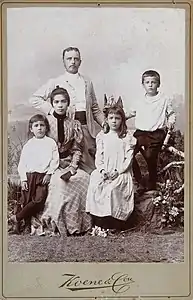 Portrait en studio d'une famille indo entre 1890 et 1910. Tropenmuseum.
Portrait en studio d'une famille indo entre 1890 et 1910. Tropenmuseum.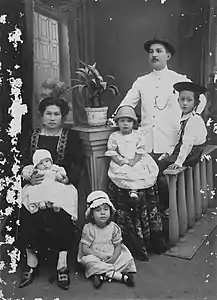 Portrait studio de la famille Engelenburg-Banjoewangi en 1919. Tropenmuseum.
Portrait studio de la famille Engelenburg-Banjoewangi en 1919. Tropenmuseum.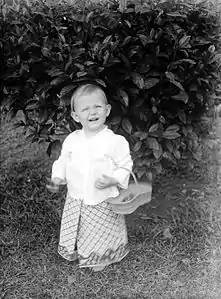
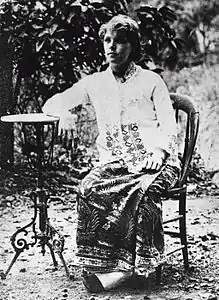
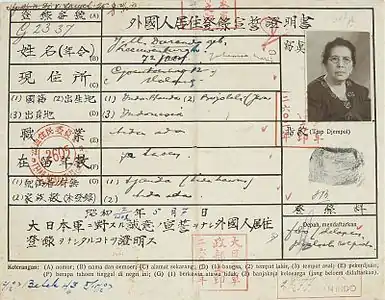 Carte d'identité avec inscriptions en japonais et indonésien de Johanna Maria Durand, née Leeuwenburgh et résidant à Malang. Tropenmuseum
Carte d'identité avec inscriptions en japonais et indonésien de Johanna Maria Durand, née Leeuwenburgh et résidant à Malang. Tropenmuseum
 Pierre Tendean, capitaine de l'armée indonésienne mort en 1965 lors du Mouvement du 30 septembre. Il est reconnu héros national d'Indonésie.
Pierre Tendean, capitaine de l'armée indonésienne mort en 1965 lors du Mouvement du 30 septembre. Il est reconnu héros national d'Indonésie.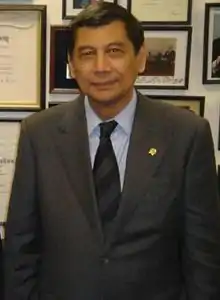

Notes et références
- (en-GB) H. van Amersfoort, « Immigration and the formation of minority groups: the Dutch experience 1945-1975 », Cambridge University Press,
- (en-GB) H. Sjaardema, « One View on the Position of the Eurasian in Indonesian Society », The Journal of Asian Studies, vol. 5, , p. 172–175 (DOI 10.2307/2049742)
- (en-GB) G. Knight, « East of the Cape in 1832: The Old Indies World, Empire Families and "Colonial Women" in Nineteenth-century Java », Itinerario, vol. 36, , p. 22–48 (DOI 10.1017/s0165115312000356)
- (en-GB) R. Betts, Decolonization, Psychology Press, , p. 81
- (en-GB) D. Yanowa et M. van der Haar, « People out of place: allochthony and autochthony in the Netherlands' identity discourse—metaphors and categories in action », Palgrave Macmillan Journals, vol. 16, , p. 227–261 (DOI 10.1057/jird.2012.13, lire en ligne, consulté le )
- P. Pattynama, « Cultural memory and Indo-Dutch identity formations », The University of Amsterdam, , p. 175–192
Bibliographie
- Bosma U. et Raben R., Being "Dutch" in the Indies: a history of creolisation and empire, 1500–1920, University of Michigan, NUS Press, (ISBN 9971-69-373-9, lire en ligne)
- (nl) Bussemaker, H. Th., Bersiap. Opstand in het Paradijs, Zutphen, Walburg Pers, .
- Cooper, Frederick et Stoler, Ann Laura, Tensions of empire: colonial cultures in a bourgeois world, University of California Press, Berkeley, (lire en ligne).
- (id) Cote, Joost et Westerbeek, Loes., Recalling the Indies: Kebudayaan Kolonial dan Identitas Poskolonial, Yogyakarta, Syarikat, .
- Crul, Lindo et Lin Pang., Culture, Structure and Beyond, Changing identities and social positions of immigrants and their children, Het Spinhuis Publishers, (ISBN 90-5589-173-8)
- (nl) De Vries, Marlene, Indisch is een gevoel, de tweede en derde generatie Indische Nederlanders, Amsterdam University Press, (ISBN 978-90-8964-125-0, lire en ligne).
- Gouda, F., American Visions of the Netherlands East Indies/Indonesia, Amsterdam, Amsterdam University Press, .
- Krancher, Jan A, The Defining Years of the Dutch East Indies, 1942–1949, McFarland & Company, Inc., Publishers (ISBN 978-0-7864-1707-0)
- (de) Indische Nederlanders und Tante Lien: eine Strategie zur Konstruktion ethnischer Identität (Thèse de Master), Canterbury University of Kent, Social Anthropology, (ISBN 0-904938-65-4)
- Palmer and Colton, A History of the Modern World, McGraw-Hill, Inc., (ISBN 0-07-557417-9).
- Ricklefs, M. C., A History of Modern Indonesia Since c. 1300, Stanford University Press, (lire en ligne).
- Schenkhuizen, M. (trad. Lizelot Stout van Balgooy), Memoires of an Indo Woman, Athens, Ohio, Ohio University Press, , chap. 92.
- (id) Soekiman, Djoko, Kebudayaan Indis dan gaya hidup masyarakat pendukungnya di Jawa, (ISBN 979-8793-86-2)
- Taylor, Jean Gelman, The Social World of Batavia: European and Eurasian in Dutch Asia, Madison, The University of Wisconsin Press, (ISBN 978-0-300-09709-2)
- Taylor, Jean Gelman, Indonesia: Peoples and Histories, New Haven, Yale University Press, (ISBN 0-300-09709-3)
Liens externes
- « Assimilation Out:Europeans, Indo-Europeans and Indonesians seen through sugar from the 1880s to the 1950s »(Archive.org • Wikiwix • Archive.is • Google • Que faire ?) (consulté le )
- Culture, structure and beyond
- Dutch East Indies, website dedicated to the Dutch-Indonesian community
- (nl) 'Indie Tabe' Master Thesis Erasmus University by Kirsten Vos about the Indo repatriation (1950–1958)
- The Indo Project, dedicated to the preservation, promotion and celebration of Indo culture and history through education and raising public awareness
- Medical Journal: European Physicians and Botanists, Indigenous Herbal Medicine in the Dutch East Indies, and Colonial Networks of Mediation via Indo-European women Hans Pols, University of Sydney
- « Eurasians: A Resource Guide »(Archive.org • Wikiwix • Archive.is • Google • Que faire ?) (consulté le )
Cet article est issu de wikipedia. Text licence: CC BY-SA 4.0, Des conditions supplémentaires peuvent s’appliquer aux fichiers multimédias.